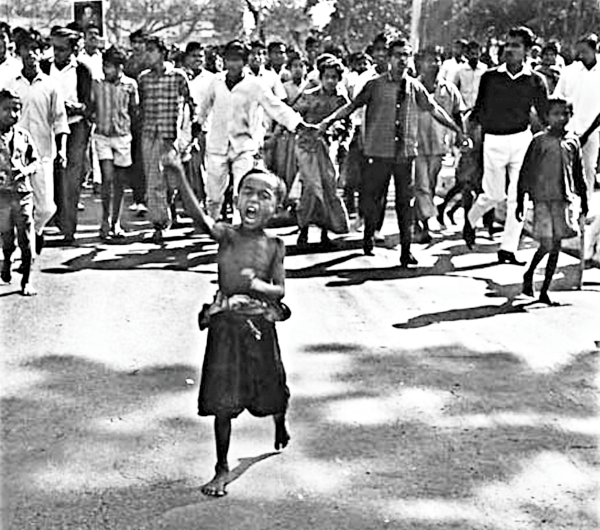Post Campus
The Story of Bangladesh:
A Silent Revolution Again Made Fresh
Asrar Chowdhury

November 1970, The coastal belt of East Pakistan was hit by one of the deadliest tropical cyclones in history. The entire Aman harvest, in the islands of Bhola and Hatia, was lost. Death toll was 300,000 to 500,000; 85% of homes were destroyed or devastated; 90% of the fishing capacity of the affected coastal belt was gone. Relief either never reached or reached when it was all too late. If this was a catastrophe, another catastrophe of apocalyptic proportion was to strike in four months and change the landscape of the nation forever.
1971 was the most glorious chapter in the nation's history. It was the most devastating one too! From the moment of crackdown of Operation Searchlight in the night of March 25, ten million people gradually dislocated in neighbouring India. This ten million were the fortunate who escaped a genocide that was unleashed on an unarmed innocent civilian population within the country. In just 266 days, three million people sacrificed their lives at 7.83 lives per minute; 469 lives per hour. This is just the average. At peak times, these figures would be higher, bearing hallmarks of one of the most brutal genocides of the twentieth century. Countless more paid the price having lost their near & dear ones; being paralysed forever; or being victims of other war atrocities. This is just the human price the nation paid for her freedom. The nation could not be silenced. A silent revolution had just begun.
The nation gelled as one and fought a just war. When a cause is just, friends come from unknown and unexpected places to extend their support. Victory is a matter of time in a just war. Freedom-loving people and nations of the world extended their hands as friends. Defying all odds, on the afternoon of December 16, 1971, a ten letter word, BANGLADESH emerged as the youngest nation on the world map.
Winning the Liberation War and putting Bangladesh on the map was one battle only. A greater war of re-building the nation had just begun. The infrastructure of the nation was brought to rubble. Intellectuals who could have guided the nation were systematically killed as a 'final solution'. The 'oil shock' of the early seventies shocked Bangladesh more than other countries. Widespread poverty, mass illiteracy, acute food shortages; and minimal connectivity characterized the Bangladeshi economy. If the 1970 Cyclone and the 1971 Liberation War were not enough, the 1974 Famine shattered the economy. In Bangladesh: The Test Case of Development (1976) Just Faaland and John Parkinson went to the length that if Bangladesh can develop, any country could. Henry Kissinger- the 1973 Nobel Laureate in Peace- certified Bangladesh as a 'basket case' (bottomless basket). Who would or could have confronted these observations then? The resilience of the nation to say 'yes, we can' from the depths of debris is a 'development surprise' practitioners failed to appreciate, but not Joan Baez when she sang in 1971 'the story of Bangladesh; is an ancient one, again made fresh'. Indeed, the story of Bangladesh is the story of a 'silent revolution' of its people.
In four decades since her birth, Bangladesh has defied all odds. Food production has surpassed population growth. 'Mora Kartik' has almost been sent to the encyclopedia. Disaster management has made famines a phenomenon of the past. Per capita GDP has more than doubled since 1971. Life expectancy has risen; child mortality has fallen; population growth rates of 3 percent are history. Providing universal basic education, especially to girls, and universal basic health care is a remarkable achievement for any developing country. Export-oriented growth in the garments industry has lead to female employment and reduction in family size. Remittance now easily flows in the billions of dollars. At the other side of the spectrum, the emergence of a vibrant urban-middle class indicates a spending power and saving capacity- prime conditions for the emergence of local entrepreneurs. This has all happened since independence. This is the 'silent revolution' of the people of Bangladesh. In 2012, the question is not if Bangladesh 'will' or 'can' become a middle-income country. The question is 'when'!
December 16, 1971 was one victory. The 'silent revolution' of the last four decades is an equally remarkable victory in spite of all hiccups. The 1971 and post- 1971 generations have gifted a wonderful launching pad to the 'Campus Generation'. Nations look back on history to make moving forward meaningful. The stage is set. The script is written. Another revolution is again made fresh for the 'Campus Generation' to take Bangladesh to her rightful place in history. Shubho Bijoy Dibosh!
(The author teaches economic theory at Jahangirnagar University and North South University.)
| 